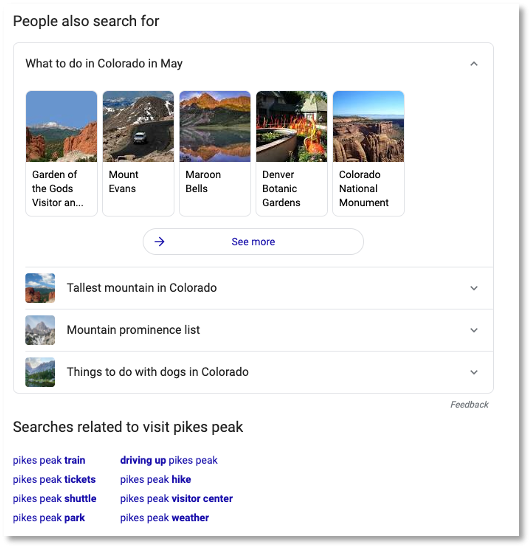4 SEO Keyword Research Tips for Finding Unique, Low Competition Keywords
If you’re still relying on the Google Keyword Planner to tell you what keywords to target, you’re missing out. Here are four research tips you can use to find keywords that your competition will overlook.

By Jordan Thomas
The organic search landscape has become progressively more competitive as waves of new content are created every day. And with the growing prominence of search engine results page (SERP) features like Instant Answers, People Also Ask and Featured Snippets, your content is now competing with Google itself in addition to other websites. The question is: How can you compete in an ever-growing sea of content?
Use Low-Competition Keywords to Boost Your Ranking
One way to compete is to identify the opportunities that your competition is overlooking. Including low-competition keywords in your SEO plan is a highly effective way to stand out in your industry and make sure your content attracts the right audience. This is particularly beneficial if your website is small or new. To find low-competition keywords, look for search terms that are:
- Long-tail phrases (three or more words)
- Highly specific
- Relevant to your organization
- Searched for less frequently
Short-tail, high-search volume phrases can also be less competitive in some circumstances. To find high-volume, low-competition keywords, look for topics that are specific to particular niches or emerging trends in your industry that have yet to garner much attention.
Where to Find Unique, Low-Competition Keyword Ideas
Coming up with keyword ideas is no easy task. After all, you can’t simply go to a tool and say, “I want low-competition keywords that will drive traffic to my website about travel in Arizona.” You have to begin the keyword research process by coming up with seed keywords.
Seed keywords are basic phrases, usually one or two words, that represent the main topic of your content. These phrases serve as the starting point you’ll use to discover related search terms to target. For example, keyword research for a travel article about the best camping options for families with kids visiting Arizona might begin with the seed keyword “arizona camping.”
Because seed keywords are usually just the first phrases that come to mind, they’re popular keywords and tend to have very high levels of search competition. Not only that but your seed keyword ideation is immediately skewed by how you would search for content and the topics you think your audience would find interesting.
Fortunately, you don’t need to spend hours pondering the many relevant searches your customers might use. Instead, use this keyword research guide to uncover less competitive keywords.
1. Industry Publications
Industry publications are a treasure trove of keyword research opportunities, and most industries will have relatively niche publications that have been putting out content for years. Their deep knowledge and experience with your target audience can easily be accessed with a review of the content topics they cover.
To illustrate, imagine that you wanted to create content around event planning. You might search for “event planner industry publications,” which might lead you to Special Events Magazine.
Upon review, you might see the article titled, “Blueprint Studios Debuts Virtual Reality Tools for Events.” Within five minutes, you’ve found the keyword “virtual reality tools for events,” which you may not have considered prior to your search. Using this as a seed keyword, you might find related keywords like:
- Virtual reality in event management
- Augmented reality event planning
- Virtual event planning
- How to use augmented reality for events
If you hadn’t previously considered this topic cluster in the past, you now have a handful of keywords that you can use to start building out content. Not only that, but you’d be creating content early on for a set of keywords that are likely to increase in volume over time.
Autocomplete suggestions can be useful for determining what language your audience is using to look for content similar to yours.
2. Forums and Social Media
Online communities and forums are often the first place your customers will turn to if they can’t find the information they need. Forums have become so integrated into search behavior, in fact, that Google has rolled out a dedicated ‘Discussions and forums’ SERP feature to display this content. This makes them an excellent place to conduct SEO keyword research.
A good place to start is with Reddit and Quora, but we also recommend industry-specific forums. For those in the tech space, you might find ideas on G2 or StackOverflow. If you work in the travel industry, check out TripAdvisor.
Don’t overlook social media’s influence on search behavior when conducting SEO research. Content platforms like YouTube, Instagram and TikTok have search features that can uncover a wealth of keyword ideas.
Start by typing a simple query into the search bar and observe how autocomplete finishes your phrase. These autocomplete suggestions can be useful for determining what language your audience is using to look for content similar to yours. For best results, conduct these searches while logged out to make sure your personal search history doesn’t influence the suggestions you get.
Hashtags are another valuable tool for keyword research. Analyzing the hashtags and post copy that your competitors and other industry influencers are using can reveal new keyword ideas that you may not have previously considered. Look for hashtags that attract high levels of engagement in the form of comments, shares and bookmarks; these terms also tend to drive high-quality traffic on traditional search engines.
3. Your Competitors
Another powerful source of keyword inspiration is your own competitor’s websites. You and your competitor likely have a lot of audience overlap, which makes their website a goldmine for keyword research.
Spend time exploring your competitors’ websites and looking for topics or keywords that come up frequently. Some blogs may display their most popular posts in a “Featured Articles” sidebar, which can give you an idea of the information users are searching for most and the language they’re using to describe the topic. To find your competitor’s keywords, examine on-page elements like:
- Page titles
- URLs
- Headlines or section titles
- Navigation menus
- Hyperlinked text
- Image captions or alt text
Take this blog post about winter travel destinations in the United States for example:

From the first paragraph of this article, we can already extract several long-tail, specific keywords like “winter travel vacation ideas us,” “best places to travel in winter in the us,” “where to travel in winter in the us” and “best winter travel destinations, which are all far less competitive than a seed keyword like “winter travel.”
Frequently Asked Questions pages are another excellent source of keyword ideas for your content. These questions reflect your audience’s most relevant wants, needs and pain points. Explore your competitor’s FAQ pages and look for questions your content has not yet addressed. Targeting these user-generated questions also gives you a better chance of earning a spot in a People Also Ask SERP feature.
4. Google Search Results
This last source of keywords was hiding right under your nose the whole time: look to Google itself.
If you knew, for example, that you wanted to create content about visiting Pikes Peak, you could start by entering “visit Pikes Peak” in Google.
As a result, you’d see these frequently asked questions:

As you open each question, new questions will dynamically appear and be added to the list. All of these questions are aligned to commonly searched queries.
Likewise, you can see sections titled “People Also Searched For” and “Searches related to visit pikes peak” when you scroll to the bottom of the results:

In the first section, you’ll note a “see more” button, which you can use to expose other ideas. Likewise, you can find nearly infinite keyword ideas by clicking the links in the “searches related to” section and repeating this process all over again.
To make your life even easier, you can plug the top search results into a keyword research tool like Ubersuggest to find additional keywords those pages are ranking for. This handy (and free!) tool will provide a detailed report about a site or page URL’s historical organic search performance, including approximately how much traffic the page gets from each keyword it ranks for.
Installing the Ubersuggest Chrome extension will also allow you to analyze keyword activity on other sites like YouTube and Amazon. This can provide helpful insights into the different types of intent (e.g., information seeking or making a transaction) users have when using a specific search term.
With this, and the other SEO keyword research techniques outlined above, you should be well on your way to identifying less competitive keywords in no time.
What’s Your SEO Strategy?
We can help build a bold, easy-to-implement plan that drives results.

